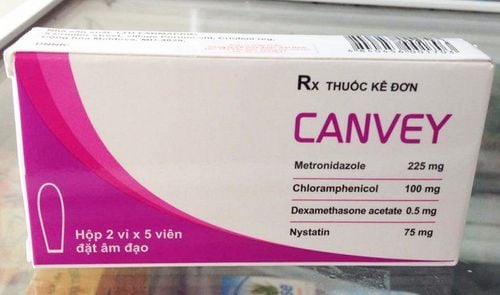Vaginal suppositories, often referred to as vaginal capsules, are a commonly used method for treating vaginitis. Proper insertion of the medication is crucial for maximizing its effectiveness and minimizing potential side effects. What precautions should you take when inserting medication into the vagina? The following article will guide how to properly administer the medication and important considerations to keep in mind during treatment.
1. Instructions for inserting medicine into the vagina
The best time to insert the medicine is in the evening, just before going to bed. This timing helps minimize the leakage of medicine out of the vagina due to movement while standing or walking. After inserting the medicine, you should lie down and rest in a comfortable position to allow it to take effect.
Before starting this insertion, wash your hands thoroughly with soap. Then, gently clean the genital area using a mild, non-irritating hygiene solution and warm water. Avoid vaginal douching while cleaning this area, and use a clean towel to dry it afterward.
Next, check the expiration date on the medication packaging to ensure it hasn't spoiled. For cream medications, carefully fill the applicator tip with the prescribed dosage. If your medication is in tablet form, follow these guidelines: For hard tablets, soak the pill in cooled boiling water for about 10 seconds to soften it before inserting it. If the medication is in soft tablet form, you can skip the soaking step.
You can choose either of the following two positions for easier medicine insertion:
- Supine osition: Lie on your back with both knees bent and legs slightly apart. You may place a pillow against your buttocks to help prevent the medicine from leaking out.
- Standing Position: Stand with one leg resting on a low chair and your legs shoulder-width apart.
To insert the medication into the vagina, use your non-dominant hand to gently separate the labia, exposing the vagina. With your other dominant hand, insert the medicine. If you are not using a medication applicator, hold the pill between two fingers and gently insert it into the vagina. Then, use your index finger to push the medication inside, reaching a depth of about one finger’s length.
If you are using a medication applicator: insert the applicator into the vagina and push the plunger until it can no longer be pushed, ensuring that all the medicine is delivered inside. Then, carefully remove the applicator.
If the tool is reusable, clean it according to the manufacturer's instructions. First, separate the piston from the cylinder, then wash both parts with water and soap. If the applicator is intended for single use, dispose of it after applying the medication. Make sure to wash your hands thoroughly after insertion.
After placing the medication, avoid exercising or going to the bathroom for 15-30 minutes. Doing so may cause the medication to leak out.

2. Notes on using Vaginal Suppositories
When using vaginal medications, it is important to avoid sexual intercourse. Engaging in sex can worsen gynecological inflammation and may also increase the risk of transmitting sexually transmitted infections to your partner.
Store vaginal suppository medications at room temperature, ideally in a cool place or in the refrigerator, to prevent them from dissolving.
During your menstrual period, you can usually continue using your medication, but it’s important to consult your doctor if you have any concerns. Avoid using tampons, as they can absorb the medication and reduce its effectiveness. Instead, opt for sanitary napkins during this time.
Use vaginal suppositories exactly as directed by your doctor. Do not purchase your own medication, as the active ingredients can vary between different products. Avoid using medications long-term without a doctor's guidance, as this may lead to drug resistance. Do not stop taking your medication on your own, even if your symptoms have improved. If you forget a dose, take it at the next scheduled time, but do not double the dose.
Some mild side effects may occur while taking the medication, such as vaginal discomfort, stinging, dryness, or discharge, etc. If these symptoms are mild, you can continue the treatment. However, if the symptoms become severe or if you notice any unusual signs, you should stop using the medication and consult your doctor for further instructions.
During and after your treatment, it's important to keep the genital area clean and dry.
Properly using vaginal medication can help ensure effective treatment and minimize the risk of unwanted reactions. Always consult your doctor before starting the medication to ensure it is appropriate for your situation.
Please dial HOTLINE for more information or register for an appointment HERE. Download MyVinmec app to make appointments faster and to manage your bookings easily.













